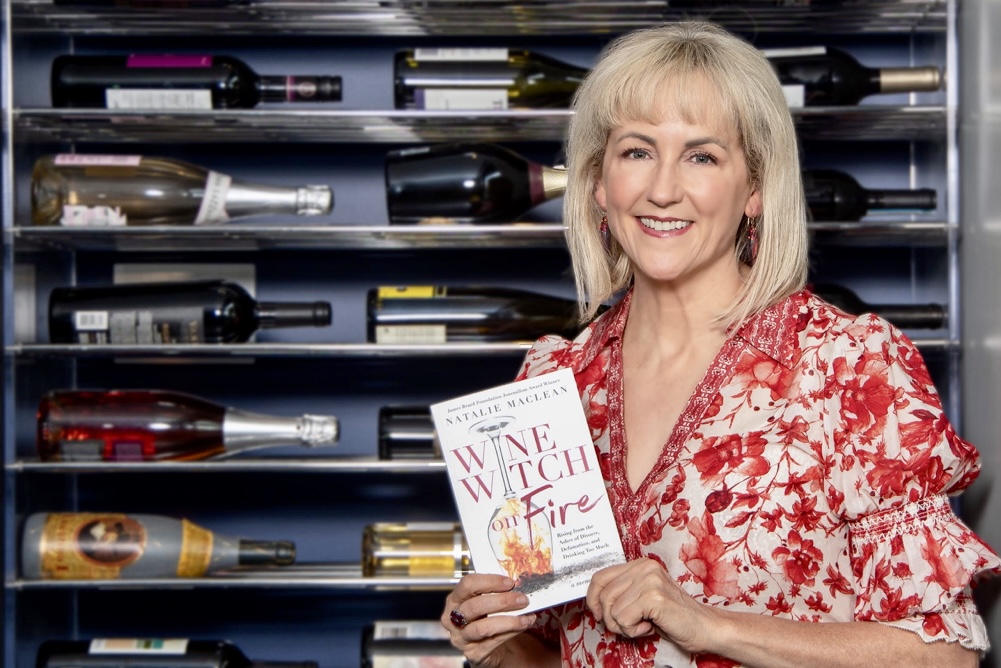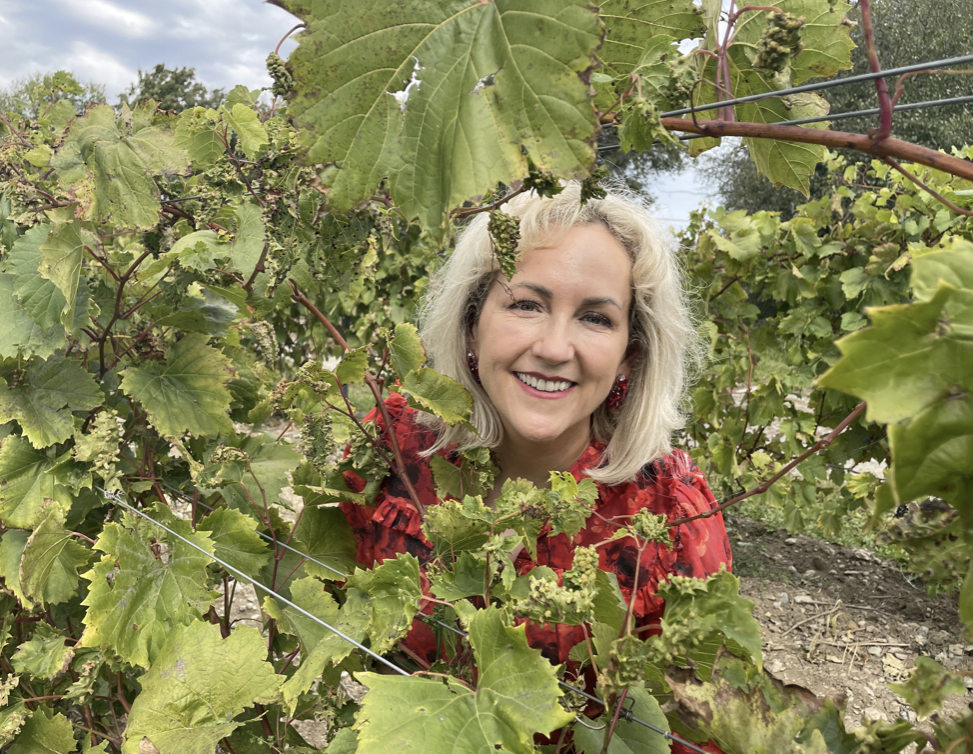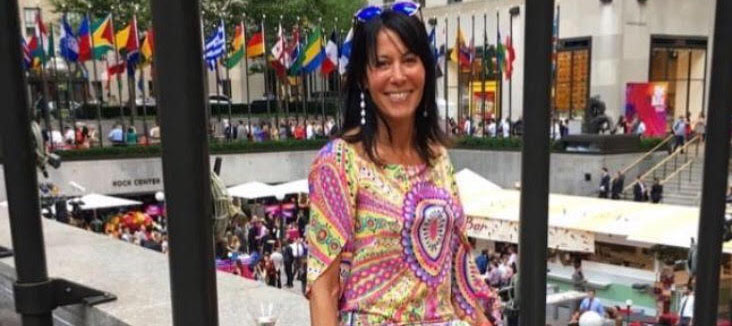
In her new book, Wine Witch on Fire: Rising from the Ashes of Divorce, Defamation, and Drinking Too Much, wine writer and educator Natalie MacLean brings a unique blend of personal reflection, wine expertise, and historical intrigue to her story. In this candid memoir, MacLean delves into sensitive topics, from her struggles with drinking to facing professional attacks and online bullying. Her story weaves in centuries-old tales of witches, adding an unconventional layer to her narrative.
Grape Collective caught up with MacLean to discuss the significance of these themes and the impact she hopes her memoir will have on readers and the wine community.
Lisa Denning: Memoirs often invite readers to reflect on their own lives. What do you hope your readers will take away from your story and apply to their own lives?
Natalie MacLean: A piece of themselves — better understood. The winemaking term “dry extract” refers to the essence of the wine’s flavor components when all the moisture has evaporated. Dry extract is in us, too, as people, our deepest reserves of strength and resilience. It’s what’s left after life has burned us down to our essence. I want readers to know that they can rise from their own terrible vintage.
Wine Witch on Fire includes deeply personal details, like your divorce, for example, and raising your son as a single mom. What were the most difficult or emotional moments to write about?
While divorce and single parenthood are deeply personal, the most exposed I felt was when writing about my issues with perfectionism and competitiveness. They coil together like a cobra and a boa constrictor. The first bites you with envy; the second squeezes the joy of life out of you. Together, they’re the undisciplined pursuit of more. They also prompt the compulsive behavior of not enough — not enough work done today, not enough awards won, not enough drinks consumed. Ultimately, I’m not enough. Now I think it’s the struggle that counts. There’s a person behind the person who was all about perfection and winning. This quieter self sees me striving and says, “Relax, sister, I’ve got you.” A memoir is a hug for your past self when you needed one but were alone.
In your memoir, you candidly discuss your drinking struggles and shed light on the often unspoken issue of overdrinking in the hospitality industry. What factors contribute to this culture, and what changes or conversations do you hope your book will inspire within the industry?
We don’t talk about this in our industry. Drinking is viewed as an occupational duty, or there’s shame in admitting a problem. U.S. Department of Health and Human Services statistics indicate that the hospitality industry, which includes wineries and restaurants, has the highest rate of substance abuse among all professions. It’s not just that we have easy access to alcohol, but we also have the professional cover of imbibing as part of our work.
We need to talk more openly about this issue so that those who feel they have a problem can get help without fearing damage to their career. We also need to introduce more balance and pacing at events, winemaker dinners, and work travel to wine regions. Most of my trips for which my expenses were paid for by a wine region or council were packed from early-morning tastings to late-night drinks after dinner. They felt like a sensory assault. There was no time for wellness, not even a walk.
You also discuss instances of sexual harassment. What advice do you offer readers who face similar challenges in their professional lives?
We need to report sexual harassment and believe those who come forward. We also need to speak up for ourselves and for others and stop dismissing so-called “minor” transgressions that have become accepted behavior. This excerpt from the book says it all.
"At my first industry-tasting event, I spotted a woman writer I knew and gave her a big hug. Right behind her was a male critic I had never met who said, “Oooh, gimme some of that, gorgeous.” His greedy fingers groped down my spine and around my waist. “Mmm, mmm, yes, ma’am.” I wanted to go home and burn off my epithelial layer. I just stood there flushing, angry with myself for saying nothing. Today, I’d tell that male critic, “Stop referring to my sexuality in the workplace. Comments like ‘Sorry you’re married,’ ‘Hey beautiful,’ and ‘I wish I were thirty years younger’ as you leer at my breasts are a power play that you’d never use on another man. I don’t care if you’re a ‘nice guy’ or from a different generation. You’re a journalist who should know better. I am here because of my professional achievements. I have a job to do, so get out of my way and keep your hairy hands off me.”
What would you say a world without sexism looks like?
A world without sexism would be a world based on merit, where girls could dream big and become who they want to be as women. In this world, we would believe people like Anita Hill and Christine Blasey Ford. It would be a world where I would pay the same as a man for a haircut and where I wouldn’t have to put my keys between my fingers when I walk in a parking lot at night. It would be a world where, if I didn’t wear make-up, people wouldn’t ask me if I’m tired or sick, and I would choose when to smile, not when someone cat calls on the street to ‘perk up, darlin.’
Sexism is interlinked with racism, classism, and all the other isms that exist because some people believe they are better than others. If all that disappeared, we’d benefit from the contributions of so many more people. Rather than fighting injustice, we’d all have so much more time to learn, to create, and to enjoy life.
Your memoir touches on professional attacks and online bullying from wine industry colleagues. Why did you include this topic?
Online attackers never see how the abuse adds up across different websites and social media channels. They don’t realize how their comments encourage even more venom. They’re only aware of the stones they throw. That’s why they often assume that they didn’t do any real damage. They justify their demonizing language because they don’t want to feel like they’re bad people. They rationalize their actions by believing the internet isn’t the real world and that the person attacked can just turn it off. But when you earn most of your living online, you can no more turn it off than a surgeon can operate outside the hospital.
They also assume that “sticks and stones will break my bones, but words will never hurt me.” However, aggressive and sexually violent comments have a real physical impact, especially on the mind. MRI scans have shown that when someone who survived a near-fatal car accident reads a script to trigger those memories, their brain activity is similar to actually experiencing an accident. They’re not remembering the trauma; they’re reliving it.
Even now, more than ten years later, I still slip into the present tense when talking about the attacks, particularly the rape threat on Twitter. The body remembers what the mind wants to forget. When I scroll down through the old social media screenshots, I’m back there. My heart races, my breath catches, and dread seeps through me. I’ve since stopped minimizing what happened as a “social media attack.” They were attacks, with real-life damage, including developing a heart murmur in response to the stress.
Wine Witch on Fire contains several educational interludes about wine, almost as if you can't help but share your wine knowledge. How does information about wine connect to the broader themes of your story?
I’ve been sharing the pleasure of wine with others for more than twenty years. It’s part of who I am, so it’s deeply connected to my story. It also provides some lighter moments because, as you say, I can’t help myself. One example from the book is when I was shopping for wine, and there was a young couple a few feet away from me debating whether a Sauvignon Blanc or Chardonnay would go better with pasta in a cream sauce. I really shouldn’t have interfered, but my instinct as a wine superhero kicked in.
"Just as a doctor would clear a crowd to use a defibrillator on someone who has collapsed from a heart attack, I want to wait for a pause in their conversation to jump in, “If you like contrasting flavors, I suggest you go with the Sauvignon Blanc. It’ll slice like a knife through the cream. But if you want to layer richness on richness, a toasty chardonnay is your ticket.” “Oh that’s great, thank you,” the woman says. She takes a sauvignon blanc from the shelf. “Yeah, thanks. We were really stumped,” her partner adds. Their happy, shining faces make me want to soar up into the clouds and use my infrared vision to scan other liquor stores and save more indecisive drinkers. Alas, I must return to my family who need me more than the throngs of wine enthusiasts. My life’s work to relieve their first-world problems will have to wait another day."
In your book, you weave in tales of witches, a theme that adds an unconventional element to the story. What inspired you to incorporate this subject, and how does it deepen the reader's understanding of your personal journey? Witches resonate with me because their strength comes from within, not from external validation. They also embody the unity of women, the power of the feminine, and the healing connection to nature. My favorite childhood stories were always about witches, both good and bad, especially The Wizard of Oz and the battling duo of Glinda the Good Witch and the Wicked Witch of the West. I was entranced with these opposing forces that I later realized were inside me. I even loved the straight-up badass White Witch of Narnia. Her wickedness was such a satisfying outlet for a tiny Miss Goodie Two Shoes. I cackled along with her. Now, of course, I realize how damaging stereotypes of women can be, and I think it’s time to reclaim the word witch and what it means: a wise woman who’s been through the fire and has come out on the other side stronger, wiser, fiercer.
Witches resonate with me because their strength comes from within, not from external validation. They also embody the unity of women, the power of the feminine, and the healing connection to nature. My favorite childhood stories were always about witches, both good and bad, especially The Wizard of Oz and the battling duo of Glinda the Good Witch and the Wicked Witch of the West. I was entranced with these opposing forces that I later realized were inside me. I even loved the straight-up badass White Witch of Narnia. Her wickedness was such a satisfying outlet for a tiny Miss Goodie Two Shoes. I cackled along with her. Now, of course, I realize how damaging stereotypes of women can be, and I think it’s time to reclaim the word witch and what it means: a wise woman who’s been through the fire and has come out on the other side stronger, wiser, fiercer.










